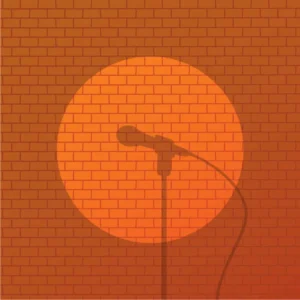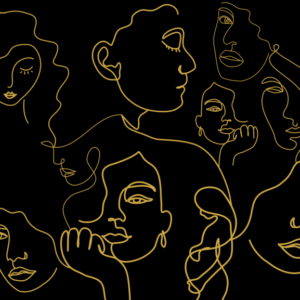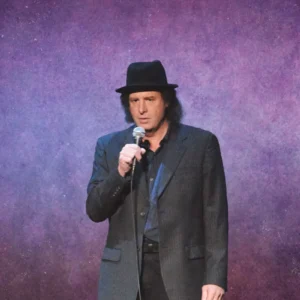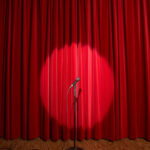Introduction
When I first began my journey into stand-up comedy, I knew deep down that comedy was my passion. But when people would ask me, “What do you do?” I’d hesitate. In my mind, I wondered, “Can I call myself a comedian?”
I was certain I wanted to be a comedian—there’s nothing quite like that adrenaline rush you get while performing on stage. But the real question was, how do I make the leap from performing once to truly becoming a comedian? How do I make that transition from a beginner to someone who can confidently say, “I am a comedian”?
Open Mics
At the start, I didn’t know much about the world of open mics or other opportunities to perform. My first taste of performing comedy came after taking a class, and I performed in the graduation show. It was exciting, but I was hungry for more.
I wanted to do comedy as often as possible—and I wanted it now. I wanted to be able to tell people without a doubt, “I’m a comedian,” and feel confident saying it. That’s when I learned from another comedian in my class about open mics.
There were magazines like L.A. Weekly and Backstage West that listed open mics, including when and where they were held. In today’s world, there are websites that track comedy clubs and open mics as well—I’ll share those later.
Each week, I’d dig through these publications, tracking down the mics, and then I’d follow up with phone calls just to confirm the dates and times. Slowly but surely, I started attending these mics regularly.
But even with all this, I still couldn’t confidently answer “Can I call myself a comedian?” with a solid “Yes.”
Some open mics were great, and some were a letdown. Some had lotteries where you’d put your name in a bowl, and whether you got on stage depended entirely on chance. Others had lists where you could sign up first-come, first-served.
Applying Business Principles to Comedy
During this time, I started to think more strategically about my approach to comedy. I’d read a lot of business books, and one idea stuck with me: optimizing my “Return on Investment” (ROI). After all, I was investing my time, money (for gas, sometimes drinks), and energy into this, so it made sense to treat it like a business.
I began choosing open mics that would give me the best ROI. Which venues could I rely on to actually get stage time? I didn’t have the luxury of spending hours waiting for a chance to perform. I wanted efficient, productive opportunities.
I made a calendar to track the mics I found to be worth attending, and from there, I could plan my week and schedule my performances accordingly. But the question remained—how many mics should I attend in a week? How much stage time was enough?
All I wanted was to be a comedian. I wanted to know, “When can I confidently say I’m a comedian?”
My mom used to tell me, “Visualize yourself on that stage every night, doing comedy.” So I did just that. And in New York, I was lucky enough to live just a block away from the Comedy Cellar.
While I was living there, I performed at four, sometimes five, open mics a night. That’s when it really hit me: this was it. I was living the life of a comedian. Comedy was no longer something I was just aspiring to do—it was what I was doing every night.
I was spending every day writing, performing, and hanging out with other comedians. There was no time for anything else. And that’s when I started to feel like a true comedian. People began to see me as one, and when I asked myself, “Can I call myself a comedian?” the answer was a resounding “Yes!”
From Open Mics to TV Spots
Just a few years after I committed to hitting those mics regularly, things really took off. I did my first TV appearance on A&E’s ‘An Evening at the Improv’, which opened the doors for more TV spots, a job writing for The Tonight Show with Jay Leno, and eventually, I was touring nearly 45 weeks a year.
Today, I perform corporate gigs, club shows, and teach a course helping other comedians learn how to make their dreams a reality.
Not everyone has the advantage of living in New York City or another comedy hub where you can perform multiple mics per night, but the key is to dedicate as much time as you can to your craft. One of my students spent six years honing her skills and then, in just two years, leveled up dramatically. She ended up performing on The Late Show with Stephen Colbert, as well as other shows like Dry Bar Comedy and Rooftop Comedy, and now travels the world performing.
I asked her how she got so good so quickly. She told me, “Fourteen mics a week.”
So if you’re looking for a number to shoot for, that’s a solid benchmark. Can she confidently say, “I’m a comedian”? Absolutely.
However, you don’t necessarily need a specific number. The goal is simply to get up as much as possible, perfect your material, and refine your act. Watch comedians on late-night shows, study their performances, and apply what you learn to your own act. Keep working on your set, and get on as many mics as you can.
Just Do It
Dr. Wayne Dyer, a success guru, once said, “Go for it now. The future is promised to no one.”
Too many comedians fall into a cycle of self-doubt, constantly wondering, “Am I ready?” “Will they like me?” and “Can I call myself a comedian?”
There’s a business philosophy that applies to comedy as well: Your product will never be perfect right out of the gate. The idea is to create your MVP—your Minimum Viable Product—then put it out there, get feedback, and improve it. Keep refining your set, performing, and improving with each performance.
Want to speed up your progress? Hire a coach, hone your skills, and keep improving. Keep getting on stage and doing as many mics as possible, knowing your act will continue to evolve and improve over time.
The bottom line is: It doesn’t matter if you’ve been paid yet, or if you’ve hit the big time. If you’re doing the work, living, breathing, writing, reading, and performing everything you can to become a comedian, then you are a comedian. And you can absolutely call yourself one.
Open Mics & Resources
For those looking to find open mics and comedy venues, here are a few resources to help you get started. Make sure to double-check that these venues are still operational, as things can change.
- Badslava – A fantastic resource for open mics and shows worldwide. Slava does an amazing job curating this database.
- Comedy Bureau – Lists open mics and shows in L.A. and NYC.
- Dead Frog – This online magazine focuses on stand-up comedy and provides a list of comedy clubs across the country.
Keep in mind that maintaining a comedy database is time-consuming, so always do follow-up research to ensure accuracy. But with these tools, you’ll be able to find mics and shows to help you take your comedy to the next level.










